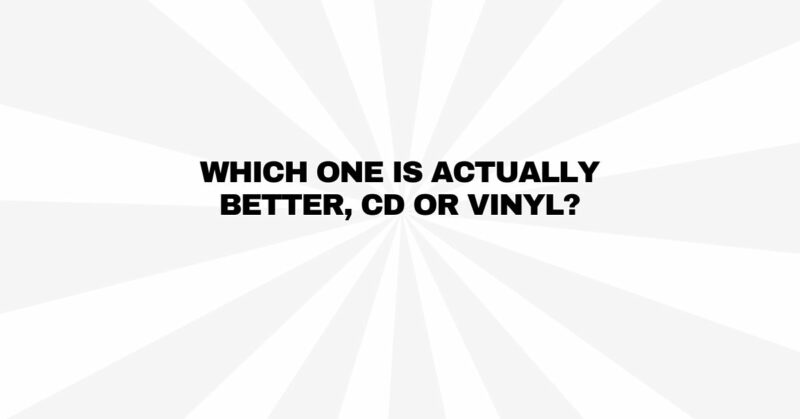The ongoing debate between vinyl records and compact discs (CDs) continues to captivate audiophiles, collectors, and music enthusiasts alike. Both formats offer distinct qualities and listening experiences, and determining which one is “better” is a subjective endeavor. In this article, we’ll explore the strengths and limitations of CDs and vinyl records to help shed light on the perennial question of which format is superior.
CDs: Digital Precision and Clarity
Compact discs, or CDs, revolutionized the music industry when they were introduced in the 1980s. They represented a significant leap in technology from the analog formats that preceded them. Here are some key features of CDs:
- Digital Clarity: CDs store music as digital data, using a precise sampling and encoding process. This digital format eliminates the imperfections associated with analog playback, such as surface noise and distortion. As a result, CDs provide clean, accurate, and faithful sound reproduction.
- Consistency: CDs offer consistent sound quality regardless of how many times they are played. Unlike vinyl records, which can degrade over time due to wear and tear from the stylus, CDs remain stable.
- Durability: CDs are resistant to physical damage, such as scratches or warping, ensuring consistent sound quality over time. Their durability makes them an attractive option for those seeking long-term audio quality.
- Dynamic Range: CDs have a good dynamic range, capable of reproducing both quiet and loud passages with precision. This can be particularly appreciated for complex musical compositions.
Vinyl Records: Analog Warmth and Tactile Engagement
Vinyl records have a rich history and an enduring appeal among music enthusiasts. They offer a different set of qualities that contribute to their perceived audio quality:
- Analog Warmth: Vinyl records store music in an analog format, with the audio physically etched into the grooves of the record. This analog process produces a warm and organic sound that is often described as having depth and character. Audiophiles appreciate this warmth, which they feel adds a level of authenticity to the music.
- Tactile Experience: Playing vinyl records involves a tactile and hands-on experience. From selecting a record to gently placing the needle and watching the disc spin, vinyl offers a unique connection to the music. This tactile engagement can enhance the overall listening experience.
- Dynamic Range: Vinyl records often have a wide dynamic range, allowing them to capture and reproduce subtle nuances in the music, particularly in acoustic instruments and quiet passages. This characteristic is particularly valued for certain genres like jazz and classical music.
- Imperfections: Vinyl’s imperfections, such as surface noise, pops, and clicks, are considered part of its charm by many enthusiasts. These analog quirks contribute to a more authentic and engaging listening experience.
Subjective Listening Experience:
The perception of which format is better often boils down to personal preferences and priorities:
- Sound Characteristics: Some listeners prefer the precision and clarity of CDs, while others are drawn to the warmth and analog character of vinyl records.
- Tactile Experience: Vinyl’s physicality and the ritual of playing records can be a significant part of the listening experience for some.
- Collectibility: Vinyl records hold a special appeal for collectors due to their artwork, packaging, and the hunt for rare and vintage releases.
- Convenience: CDs and digital formats offer convenience and portability, allowing listeners to access music instantly and carry vast libraries with them.
Conclusion:
Determining whether CDs or vinyl records are better ultimately depends on individual tastes and priorities. Each format offers a unique listening experience and has its own set of strengths. Some listeners may appreciate the precision and clarity of CDs, while others find the warmth and character of vinyl records more appealing.
The choice between CDs and vinyl often comes down to personal preferences, the specific music being enjoyed, the quality of playback equipment, and the emotional connection one seeks from their music. Both formats have their place in the world of audio, ensuring that listeners have a diverse range of options to suit their individual tastes and lifestyles. Ultimately, the “better” format is a matter of personal choice and the specific qualities one values in their listening experience.


